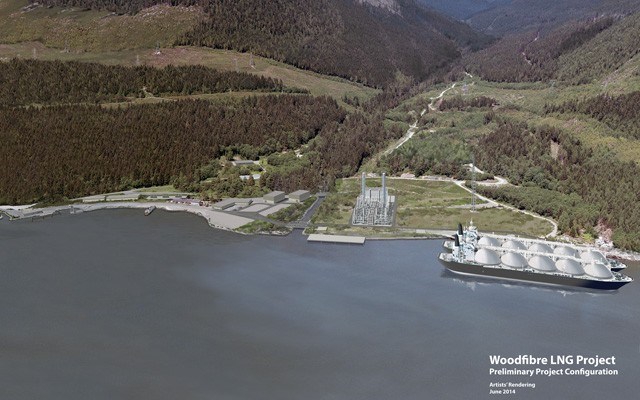The controversial Woodfibre LNG (WFLNG) facility planned near Squamish inched closer to becoming a reality Monday, Oct. 26, when it received environmental approval from the provincial government.
The province issued an environmental certificate for the $1.6-billion gas export facility proposed for the former Mill Creek sawmill site, but with 25 conditions attached intended to lessen the development's impacts on the environment and marine traffic.
"Receiving environmental approval in British Columbia is not only an important milestone for the Woodfibre LNG project, but it means the people of Squamish and the region are one step closer to realizing the opportunities that an industrial project like Woodfibre LNG can bring," said Byng Giraud, Woodfibre's VP of corporate affairs, in a release.
The project still needs environmental approval from the federal government, and has yet to be granted the required permits from the B.C.'s Oil and Gas Commission.
Fortis BC's application for a natural gas pipeline that would feed into the LNG plant is currently undergoing its own environmental assessment and has not yet been approved.
Squamish Mayor Patricia Heintzman said she wasn't "overly surprised" with the province's decision.
"I think the provincial government's been pretty keen on getting this project going so I wasn't shocked the certificate came through," she added.
While she hasn't gone through Victoria's list of conditions in detail, she said there were a few figures included in the province's reasoning that will require further understanding — namely, the $21 million in local and municipal tax revenue that's been attached to the project.
"That's certainly not the calculations we've done," she said, noting that the District of Squamish puts that amount in the $5- to $7-million range.
A follow-up email from Woodfibre clarified that the figure referred to the estimated economic impacts of the project in B.C. as a whole, not only Squamish.
Heintzman also expressed major concerns around the plant's proposed seawater cooling pipe, which biologists believe will cause irreparable damage to marine life in Howe Sound, and the shipping routes proposed to the site.
Earlier this month, the Squamish Nation council agreed to sign an environmental assessment agreement with Woodfibre, which gives the nation considerable influence over how the project can move forward.
"Although the province has considered our conditions for WFLNG, it has not yet come to agreement with the Nation on the conditions the province is responsible for. This is a condition of the WFLNG approval," said Squamish Nation Chief Ian Campbell in a release.
The contentious LNG plant has garnered loud opposition both locally and beyond, with councils from Bowen Island, Lions Bay and West Vancouver all coming out against the proposal.
"My reaction is disappointment that (the provincial government) is not listening to the groups and the B.C. population that are against this project," said Delena Angrignon, co-founder of community activist group, My Sea to Sky.
While she is hopeful a new leader in Ottawa will lead to a reconsideration of Woodfibre's proposal, it's unclear what Prime Minister-designate Justin Trudeau will do with the file.
Trudeau has vowed to make Canada's environmental assessments "credible" again, promising to improve regulatory oversight so it's more inclusive of public opinion — something that Angrignon felt was sorely lacking in the provincial approval process.
"The reality is when you allow for a proponent-driven monitoring regulation system, you're going to have so many gaps," she said.
Added Heintzman, "Trying to understand how rhetoric on the campaign translates into a decision by the federal government, I wouldn't even want to speculate."
She also called for greater transparency from B.C.'s Environmental Assessment Office.
"The initial draft stage for the first time wasn't transparent at all. Usually you put that out to the public for review prior to finalization, but this time it was all done in a closed manner," said Heintzman. "Should there be more access to technical meeting deliberations? I think so. But that's the way the process is set up and it's certainly imperfect."
Another hurdle Woodfibre has yet to clear is the current glut of crude oil on the market, which has forced the price of natural gas to plummet. The company has yet to commit to a financial investment decision.




